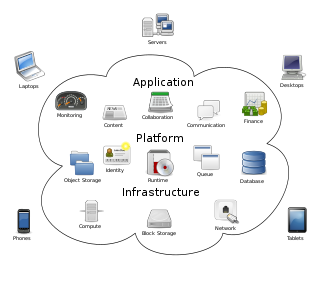
VMware, Inc. is an American cloud computing and virtualization technology company with headquarters in Palo Alto, California. VMware was the first commercially successful company to virtualize the x86 architecture.

NetApp, Inc. is an American hybrid cloud data services and data management company headquartered in San Jose, California. It has ranked in the Fortune 500 from 2012–2021. Founded in 1992 with an IPO in 1995, NetApp offers cloud data services for management of applications and data both online and physically.
A virtual appliance is a pre-configured virtual machine image, ready to run on a hypervisor; virtual appliances are a subset of the broader class of software appliances. Installation of a software appliance on a virtual machine and packaging that into an image creates a virtual appliance. Like software appliances, virtual appliances are intended to eliminate the installation, configuration and maintenance costs associated with running complex stacks of software.

WaveMaker is an enterprise grade Java low code platform for building software applications and platforms. WaveMaker Inc. is headquartered in Mountain view, California. For enterprises, WaveMaker is a low code platform that accelerates their app development and IT modernization efforts. For ISVs, it is a consumable low code component that can sit inside their product and offer customizations.

The Rackspace Cloud is a set of cloud computing products and services billed on a utility computing basis from the US-based company Rackspace. Offerings include Cloud Storage, virtual private server, load balancers, databases, backup, and monitoring.

Cloud computing is the on-demand availability of computer system resources, especially data storage and computing power, without direct active management by the user. Large clouds often have functions distributed over multiple locations, each location being a data center. Cloud computing relies on sharing of resources to achieve coherence and typically using a "pay-as-you-go" model which can help in reducing capital expenses but may also lead to unexpected operating expenses for unaware users.
Eucalyptus is a paid and open-source computer software for building Amazon Web Services (AWS)-compatible private and hybrid cloud computing environments, originally developed by the company Eucalyptus Systems. Eucalyptus is an acronym for Elastic Utility Computing Architecture for Linking Your Programs To Useful Systems. Eucalyptus enables pooling compute, storage, and network resources that can be dynamically scaled up or down as application workloads change. Mårten Mickos was the CEO of Eucalyptus. In September 2014, Eucalyptus was acquired by Hewlett-Packard and then maintained by DXC Technology. After DXC stopped developing the product in late 2017, AppScale Systems forked the code and started supporting Eucalyptus customers.

OpenStack is a free, open standard cloud computing platform. It is mostly deployed as infrastructure-as-a-service (IaaS) in both public and private clouds where virtual servers and other resources are made available to users. The software platform consists of interrelated components that control diverse, multi-vendor hardware pools of processing, storage, and networking resources throughout a data center. Users manage it either through a web-based dashboard, through command-line tools, or through RESTful web services.

OpenNebula is a cloud computing platform for managing heterogeneous distributed data center infrastructures. The OpenNebula platform manages a data center's virtual infrastructure to build private, public and hybrid implementations of Infrastructure as a Service. The two primary uses of the OpenNebula platform are data center virtualization and cloud deployments based on the KVM hypervisor, LXD/LXC system containers, and AWS Firecracker microVMs. The platform is also capable of offering the cloud infrastructure necessary to operate a cloud on top of existing VMware infrastructure. In early June 2020, OpenNebula announced the release of a new Enterprise Edition for corporate users, along with a Community Edition. OpenNebula CE is free and open-source software, released under the Apache License version 2. OpenNebula CE comes with free access to maintenance releases but with upgrades to new minor/major versions only available for users with non-commercial deployments or with significant contributions to the OpenNebula Community. OpenNebula EE is distributed under a closed-source license and requires a commercial Subscription.
Nimbula was a computer software company that existed from 2008 to 2017. It developed software for the implementation of public and private cloud computing environments.
IBM cloud computing is a set of cloud computing services for business offered by the information technology company IBM. IBM Cloud includes infrastructure as a service (IaaS), software as a service (SaaS) and platform as a service (PaaS) offered through public, private and hybrid cloud delivery models, in addition to the components that make up those clouds.
Greenqloud is a cloud computing software company with headquarters in Reykjavik, Iceland, and office in Seattle, Washington, offering cloud computing software and services. Greenqloud develops and sells the cloud and infrastructure management software Qstack for the global market.
A cloud database is a database that typically runs on a cloud computing platform and access to the database is provided as-a-service. There are two common deployment models: users can run databases on the cloud independently, using a virtual machine image, or they can purchase access to a database service, maintained by a cloud database provider. Of the databases available on the cloud, some are SQL-based and some use a NoSQL data model.
CloudStack is open-source cloud computing software for creating, managing, and deploying infrastructure cloud services. It uses existing hypervisor platforms for virtualization, such as KVM, VMware vSphere, including ESXi and vCenter, and XenServer/XCP. In addition to its own API, CloudStack also supports the Amazon Web Services (AWS) API and the Open Cloud Computing Interface from the Open Grid Forum.
HP ConvergedSystem is a portfolio of system-based products from Hewlett-Packard (HP) that integrates preconfigured IT components into systems for virtualization, cloud computing, big data, collaboration, converged management, and client virtualization. Composed of servers, storage, networking, and integrated software and services, the systems are designed to address the cost and complexity of data center operations and maintenance by pulling the IT components together into a single resource pool so they are easier to manage and faster to deploy. Where previously it would take three to six months from the time of order to get a system up and running, it now reportedly takes as few as 20 days with the HP ConvergedSystem.
HP CloudSystem is a cloud infrastructure from Hewlett Packard Enterprise (HPE) that combines storage, servers, networking and software.

HP Cloud was a set of cloud computing services available from Hewlett-Packard (HP) that offered public cloud, private cloud, hybrid cloud, managed private cloud, and other cloud services. It was the combination of the previous HP Converged Cloud business unit and HP Cloud Services, an OpenStack-based public cloud. It was marketed to enterprise organizations to combine public cloud services with internal IT resources to create hybrid clouds, or a mix of private and public cloud environments, from about 2011 until 2016.
Enstratius was a cloud computing infrastructure management platform founded in Minneapolis in 2008. It was intended to address governance issues associated with deploying systems in public, private, and hybrid clouds. More than twenty public and private clouds are supported, as well as configuration management tools such as Chef and Puppet. Enstratius supports both SaaS and on-premises deployment models.
Cloud management is the management of cloud computing products and services.

CloudBolt is a hybrid cloud management platform developed by CloudBolt Software for deploying and managing virtual machines (VMs), applications, and other IT resources, both in public clouds and in private data centers.









